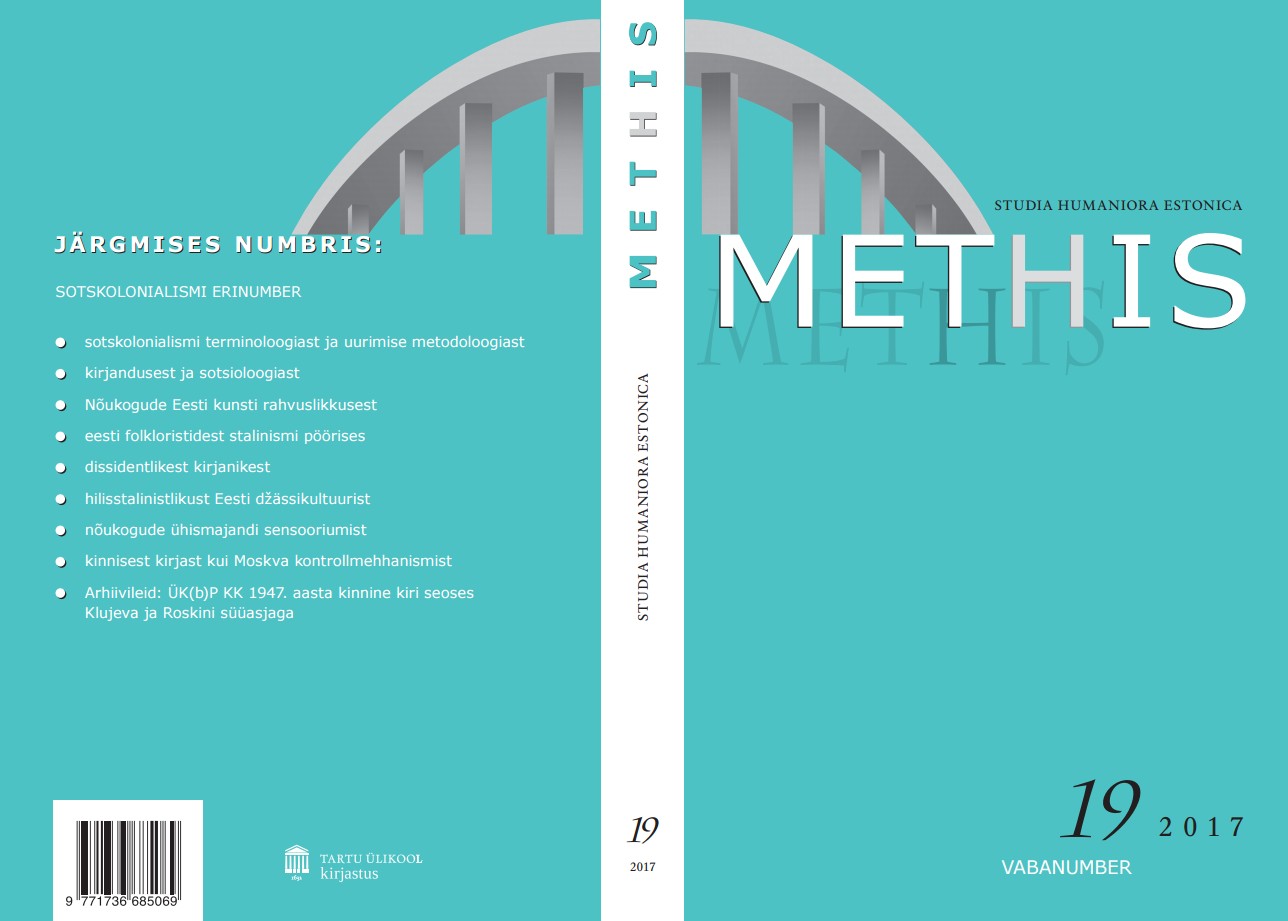M-äng Mati Undi „Tühirannas“ ja „Via regias“ / Angst and play in the fiction of Mati Unt
DOI:
https://doi.org/10.7592/methis.v15i19.13439Keywords:
modernism, postmodernism, mänguteooria, absurd (kirj.), eksistentsialism, game theory, absurd in literature, existentialismAbstract
Artikkel käsitleb Mati Undi 1970. aastate alguse loomingut mõiste m äng abil, mis võimaldab esile tuua, kuidas kirjaniku teostes põimuvad modernistlikud ja postmodernistlikud stilistilised võtted. Artikli esimeses osas tuleb vaatluse alla teoste kirjutamise aegne kultuuriline kontekst ning avatakse mõistete äng ja mäng teoreetilised taustad eksistentsialismi, psühhoanalüüsi jm raamistike kaudu. Ängi ja mängu suhe tuleb analüüsitavates teostes kõne alla ruumi ja subjektsuse vaatepunktist, millele keskendub artikli teine pool. Undi romaanide käsitlemisel mõiste m äng abil on lähtutud ka neis esinevatest piiripealsuse elementidest.
The aim of this article is to analyse Mati Unt’s two short novels Empty Beach (Tühirand, 1972) and Via Regia (1975) on a modernist–postmodernist scale. I have approached these novels with key concepts—angst and play, the relations of which characterise the complex transitional period between modernism and postmodernism.
Commonly, these and other Mati Unt’s novels of the 1960s and 1970s have been seen as modernistic, although the cultural context in Estonia of this era was fertile for postmodernist phenomena. The turn of the decade was a socially difficult time when long stagnation period started to emerge and optimism from the last decade subsided. Culturally, however, this situation brought along many innovations like the rise of existentialism, absurdism and modernism. Because of increased censorship, texts became double coded and besides modernism it was a ground for the sprouting of postmodernist phenomena. Also, at the end of 1960s and in the beginning of 1970s play was firmly a social phenomenon. It was a time when artist circles started with first happenings and performances—direct play with which to mysteriously express their mentality towards the social situation of that time. Since art, literature and other cultural phenomena were very interrelated, then Unt wrote these ideas in his short novels considering the concept of space.
Play is an ambivalent and complex concept to interpret literature. It might be questionable to use it at all, as literature is a priori playful. But because there are no sufficient methods for analysing playfulness in literature, it seems a legitimate and necessary task to engage play. This research shows briefly that play is a substantial concept for analysing the fine line between modernism and postmodernism.
In Empty Beach the protagonist recreated himself—an individuation with angst and in Via Regia angst turned into play which ended in an absurd limit situation (Grenzsituation). Considering play in both Empty Beach and Via Regia the most profound were Richard Schechner’s dark play and maya-lila, Roger Caillois’ agon, mimicry and ilinx play which raised an important topic of playing with identity and (postmodern) subjects.
Studying this subject underlined how complex and intertwined angst and play are in the fiction of Mati Unt. In both Empty Beach and Via Regia, Mati Unt has entwined angst and play which are bound together with irony. In other words: tragic with angst has been softened with tragicomic play. Scholar Jaan Undusk has raised a profound question that perhaps Unt’s universe is playing with one of the most powerful existential suspicion there is—maybe there isn’t anything besides theatre, théâtre comé-tragique?
Studying this subject underlined how complex and intertwined angst and play are in the fiction of Mati Unt. Also, it is not sufficient enough to consider Mati Unt’s work from the beginning of 1970s only as modernistic, because the poetics of moderism started to decay, which created a ground for postmodernistic play.


